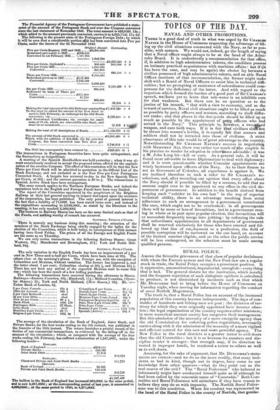TOPICS OF THE DAY.
NAVAL AND OTHER PROMOTIONS.
THERE is a good deal of truth in what was urged by Sir Cambium NAPIER in the House of Commons respecting the advantage of till- ing up the civil situations connected with the Navy, as far as pos- sible, with seamen. We would not, indeed, go the length of saying that a Naval officer ought always to be at the head of the Admi- ralty Board. It is undoubtedly a recommendation for that office, if, in addition to high administrative talents, the candidate possess an intimate practical acquaintance with maritime affairs : but if (it has been the case, and may be again) the choice lay between a civilian possessed of high administrative talents, and an able Naval Officer destitute of that recommendation, the former might make shift with a Board of Naval Officers to assist him in technical diffi- culties; but no prompting or assistance of subordinates could com- pensate for the deficiency of the latter. And with regard to the nepotism which formed the burden of a good part of Sir Cnamas's speech, we:have yet to learn that salt-water is an infallible cure for that weakness. But there can be no question as to the justice of his remark, " that with a view to economy, and as the reward of services, Naval civil situations ought to be filled as much as possible by petty officers and seamen, according to thefr differ- ent ranks ; and that places in the doc:cyards should be filled up as much as possible by the appointment of petty officers who had served in the Navy.' This principle is, however, a two-apiged weapon, and cuts both ways. If it is fair that civilians shall not be thrust into seamen's berths, it is equally fair that seamen and soldiers shall not be intruded into those of civilians. A strict observance of this rule would be of great advantage to the country. Notwithstanding Sir CHARLES NAPIER'S success in negotiating with Mzuzscsr Ara, there was rather too much °Nile empiric in his practice to render its adoption in othereases advisable : it was a St. John Long hit—kill or cure. As a general rule, it will be found most advisable to leave Diplomatists to deal with diplomacy; and it is even questionable whether Consular appointments are wisely bestowed upon officers of the Navy. As to their fitness to act as Governors of Colonies, all experience is against it. We are inclined therefore to tack a rider to Sir CHARLES'S re- solutions, and, after recording our opinion that every office about the Navy should if possible be filled by a seaman, to add that no seaman ought ever to be appointed to any office in the civil de- partment of government. In addition to the benefit derived from keeping each "cobbler to his own last" in the way of superior technical ability, there is an advantage resulting from strict adherence to such an arrangement in a government constituted like ours, which ought not to be overlooked : in all governments there will be more or less of favouritism, but in a government rest- ing in whole or in part upon popular election, this favouritism will ex necessitate frequently merge into jobbing : by enforcing the rule that subordinate appointments in all departments of government shall be reserved exclusively for those who have entered and fol- lowed up that line of employment as a profession, the field of possible corruption will be narrowed on the one hand, on account of the limited number eligible and on the other the public service will be less endangered, as eligible, selection must be made among qualified persons.


























 Previous page
Previous page